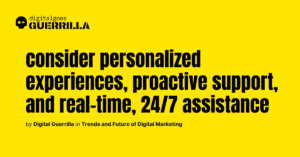Customer engagement is more than just responding to inquiries—it’s about creating seamless, personalized experiences that drive loyalty and satisfaction. As businesses look for scalable ways to enhance customer interactions, chatbots have emerged as powerful tools in improving engagement. Far from simple Q&A systems, modern chatbots harness the power of AI to deliver personalized, real-time support that meets the evolving expectations of today’s customers.
In this post, we’ll explore how chatbots are transforming customer engagement, with practical insights you can apply to your digital marketing strategy.
The Rise of AI Chatbots: Revolutionizing Customer Engagement
Customer engagement has evolved rapidly, and with it, the tools we use to foster meaningful interactions. Where traditional customer service channels like email or phone used to dominate, customers now expect instant, 24/7 service—anywhere and everywhere. This is where chatbots excel, providing automated, real-time responses that meet the demand for instant gratification.
AI-powered chatbots allow businesses to engage customers proactively, delivering tailored solutions and creating a frictionless experience. What’s key here is that these bots are not limited to answering basic questions; they can drive conversions, nurture leads, and gather valuable insights into customer behavior. Chatbots help you not just meet expectations but exceed them, increasing customer satisfaction and loyalty over time.
How Chatbots Deliver Personalized Customer Experiences
Personalization is a driving force behind effective customer engagement. Today’s consumers expect businesses to understand their preferences, anticipate their needs, and offer relevant solutions—often before they even ask for them. This is where chatbots, powered by AI and machine learning, shine.
Modern chatbots analyze customer behavior in real time, using data from previous interactions to deliver personalized recommendations. For instance, in eCommerce, a chatbot can suggest products based on a customer’s browsing history or purchase patterns. In the service industry, chatbots can guide users to the right support resource by identifying common issues based on their profile.
Moreover, chatbots can engage customers with personalized offers or discounts. For example, if a customer abandons their cart, a chatbot can follow up with a reminder or an exclusive offer to encourage conversion. This type of proactive engagement fosters deeper relationships by making customers feel valued and understood.
Read more about personalization and customer experience
Proactive Chatbots Keep Customers Engaged and Loyal
One of the standout features of chatbots is their ability to engage proactively, which sets them apart from traditional, reactive customer service approaches. Rather than waiting for customers to reach out with an issue, chatbots can initiate conversations based on predefined triggers. This could be a greeting when a customer lands on your website, a prompt offering help after a few minutes of inactivity, or a tailored message encouraging a repeat purchase.
By proactively addressing potential concerns or offering relevant information, chatbots prevent frustration and reduce customer churn. They anticipate needs and keep customers engaged, which is especially important in competitive markets where brands must work harder to retain loyalty.
For instance, in the SaaS space, a chatbot could monitor a user’s engagement with a product and offer guidance or resources when usage drops, thus improving retention rates. Similarly, in retail, chatbots can remind customers of an expiring promotion, driving urgency and boosting sales.
The Power of Instant, 24/7 Chatbot Support
In today’s always-on world, customers expect instant responses—whether it’s 2 PM or 2 AM. Chatbots allow businesses to provide 24/7 customer support without the need for round-the-clock staffing. This ensures that customers can get the help they need whenever they need it, without delay.
Instant support not only enhances customer experience but also keeps potential buyers from bouncing to a competitor’s website out of frustration. Chatbots can handle a high volume of inquiries simultaneously, ensuring that no customer is left waiting for too long. Additionally, chatbots can seamlessly escalate more complex queries to human agents when necessary, ensuring a balanced and efficient service experience.
For instance, industries like travel and finance benefit greatly from chatbots’ ability to provide immediate assistance to customers—whether it’s checking account balances, booking tickets, or answering frequently asked questions.
Boost Engagement on Social Media with Interactive Chatbots
Social media platforms have become key channels for customer engagement, and chatbots are playing a vital role in enhancing these interactions. Platforms like Facebook Messenger, WhatsApp, and Instagram now support chatbots that automate conversations, offer personalized product recommendations, and even help complete purchases directly within the app.
These chatbots streamline the customer journey by providing users with instant answers and interactive experiences without leaving the platform. A chatbot could recommend products, send updates on order statuses, or help customers find the perfect service—all within a conversation on Instagram or WhatsApp. This improves the overall customer experience, turning social media engagement into tangible business results.
In 2021, LEGO launched a chatbot called “Ralph” on Facebook Messenger, helping users find gift ideas by asking questions about the recipient’s age, interests, and preferences. This not only improved engagement but also increased conversion rates, as the chatbot guided users to personalized product recommendations.
Learn more about how you can increase engagement in social media channels
Actionable Insights: Chatbots Gather Crucial Customer Data
One often overlooked aspect of chatbots is their ability to collect and analyze customer data. Every conversation with a chatbot provides valuable insights into customer behavior, preferences, pain points, and buying patterns. By analyzing these interactions, businesses can improve their customer journey, identify opportunities for product or service improvements, and refine their marketing strategies.
For example, chatbots can track which questions are asked most frequently or what products are most commonly recommended and purchased. This data helps marketers adjust messaging, optimize websites, and create targeted campaigns based on real user feedback.
In addition, chatbots can help businesses segment their audience more effectively by identifying high-quality leads and prioritizing follow-ups with those more likely to convert. This allows sales teams to focus on the most promising opportunities, while the chatbot continues nurturing other leads.
Read what role does content play in a digital marketing strategy
Future Trends: What’s Next for Chatbots in Customer Engagement?
As chatbot technology evolves, we can expect to see even more advanced applications that further enhance customer engagement. One emerging trend is the integration of voice-activated chatbots, which provide hands-free support for users through smart speakers and mobile devices. These voice-powered bots, combined with conversational AI, will create more natural, intuitive customer interactions.
Another future development is the rise of hyper-personalization, where chatbots will leverage deeper customer data to deliver highly tailored content, offers, and recommendations in real time. This level of customization will foster even stronger customer relationships.
Additionally, chatbots may begin to integrate with augmented reality (AR) and the Internet of Things (IoT), creating immersive, interactive customer experiences across devices and platforms.
Conclusion: Leverage Chatbots to Boost Engagement and Satisfaction
Incorporating chatbots into your digital marketing strategy offers a powerful way to enhance customer engagement. By providing personalized experiences, proactive support, and real-time, 24/7 assistance, chatbots help businesses build stronger relationships with their customers. Moreover, the data and insights gathered from chatbot interactions can inform future marketing decisions and refine customer engagement strategies.
As you look to improve customer satisfaction and engagement, consider implementing or upgrading chatbot technology to meet evolving customer expectations. With AI-driven personalization and seamless integration across channels, chatbots are revolutionizing how businesses engage their customers—offering a scalable, efficient, and future-ready solution.




